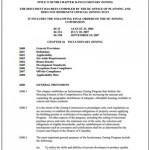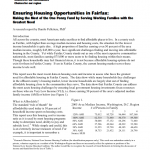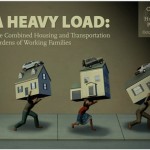More than a decade after the Brookings Institution released the seminal Region Divided report, the Washington region is still divided, with parts of D.C. and the east side of the region not sharing in the prosperity of our economy.
Despite some progress in the last decade, many eastern communities continue to fall on the wrong side of the regional divide with slow job growth, poorly performing schools, high crime, and a devastating home foreclosure crisis. Meanwhile, even in wealthier communities throughout the region many families struggle to keep up with rising housing costs, a situation made even worse by the a lack of diversity in housing types and transit-oriented development.
Addressing this challenge is the most important mission of CSG. With our focus integrating the interconnected issues of land use, housing, and transportation, we are uniquely situated to address this divide through changes in infrastructure policies and our work in local communities across the region. Providing more housing options close to jobs in job-rich areas, creating incentives for jobs to be focused at underdeveloped Metro stations on the east side of the region, focusing businesses in transit-accessible locations, and linking affordable housing and transit, are among the key solutions.
Latest Happenings
Washington DC - Meeting the growing demand for conveniently located homes in walkable neighborhoods could significantly reduce the growth in the number of miles Americans drive, shrinking the nation’s carbon footprint while giving people more housing choices, according to a team of urban planning researchers.

The following document represents a consolidated version of Title 11 DCMR Chapter 26 Inclusionary Zoning. The document has been compiled by the DC Office of Planning and does not represent official zoning text. This chapter established an Inclusionary Zoning Program that furthers the Housing Element of the Comprehensive Plan by increasing the amount and expanding the geographic distribution of adequate, affordable housing available to current and future residents.

We co-authored "Ensuring Housing Opportunities in Fairfax" using 2005 – 2007 local data on housing costs and income to assess who faces the greatest need for affordable housing in Fairfax County. The analysis was undertaken following criticism by local housing advocates, who decried that the county’s ‘One Penny’ local housing trust fund was used to help finance preservation of units allocated to households making as much as $100,000 per year.
Since 2000, WRN has been involved with the question of what kind of redevelopment at the Takoma Metro station would do the most to enhance transit access, improve the station area and larger community, help meet the need for more housing near transit. Appropriate development at the Takoma Metro station helps accommodate our region’s growth in a way that enhances the Takoma neighborhood while contributing to the solution for our region’s transportation, air and water pollution problems.

The Coalition for Smarter Growth prioritizes the production and preservation of affordable housing, especially with access to transportation choices and jobs, as one critical element of truly interconnected, sustainable communities.



